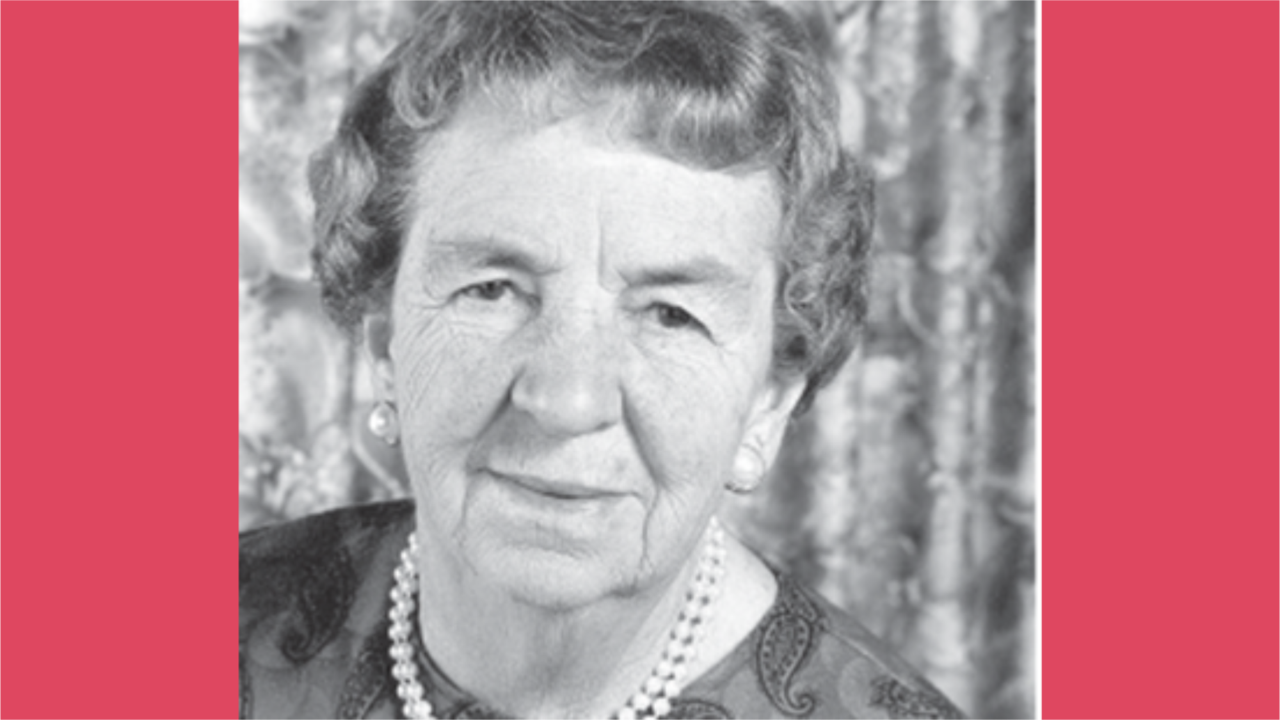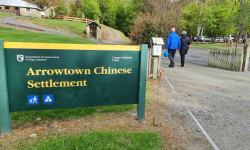
Hazel served with the NZBMS in East Pakistan (Bangladesh) and Tripura, India from 1947 to 1965. In 1975, aged about 56, She married a Baptist leader, widower Jack Smith, and continued to work for God in New Zealand. Hazel was much loved by both Bengali and New Zealand colleagues.
Early Training
Hazel May Drew was born on March 1, 1919 in Dunedin, where, along with her parents and three sisters, she attended Hanover Street Baptist Church. When her father, Vernon Drew, was appointed YMCA secretary in Auckland in 1926, the family moved north where they linked up with Mt Eden Baptist Church. Hazel soon joined in Bible Class and Christian Endeavour while attending Auckland Girls’ Grammar School. She also joined Girl Guides and became lieutenant and captain of the company.
Hazel next graduated from the Auckland Business College as a typist and secretary, skills which were to stand her in good stead throughout her life.
During this time, Hazel met Herbert McGregor, a dedicated and gifted student from the Bible Training Institute (BTI, now Laidlaw College) who was sent on assignment to her church. They fell in love and in 1940 became engaged to be married. With Herbert now in pastoral training at Carey College, they planned to serve together in ministry. Tragically, Herbert developed a painful illness and needed an ear operation followed by many weeks in hospital. Despite the best care available, he died.
Hazel’s dream was destroyed, but in the process she discovered another, when she noticed the dedicated work of the nurses who cared for Herbert. She decided that she too would become a nurse. For the next four years she trained at Waikato Hospital, and followed that with two years at BTI (where in her second year she became ladies’ prefect).
By age 27, Hazel was a qualified secretary, a trained nurse, and holder of excellent Bible teaching credentials.
India
When news came that Eunice Ogilvie, a New Zealand Baptist missionary, could not return to India due to poor health, Hazel applied to the Missionary Society and was accepted. After a farewell service on September 30, 1947, she crossed the Tasman to Adelaide to board the ancient P & O liner, Madura, and sailed for Calcutta.
At this time India was in turmoil. It had won independence from Britain at the expense of partition into India and Pakistan. This latter brought widespread rioting, bloodshed and floods of refugees. While Hazel had missed the worst of the terror, she still needed determination and hard work to get used to the climate and culture, and still needed to learn to speak Bengali. For part of her three years of language study, Hazel attended a course in Darjeeling in the Himalayas, and was delighted to be able to climb up Tiger Hill to see the sunrise over Mt Kanchenjunga.
From 1950 to 1965 Hazel was assigned to Agartala, the capital city of India’s tiny Tripura State, bounded on its east by India and on its other three sides by the new territory, East Pakistan (later Bangladesh). There she worked with Dr Nola Ivory, developing the hospital from a primitive bamboo ward into a 12 bed cottage hospital. Hazel became the Nursing Superintendent. Besides caring for the hospital’s in-patients, there were hundreds of outpatients to deal with and clinics were held in the outlying villages. This meant extended tours on foot from village to village in various parts of Tripura State. Gentle, humble, self-effacing, even feeling that others could do things better than herself, Hazel was in reality a capable and versatile multi-tasker.
Much of Tripura was a wilderness of rainforest with a great variety of trees and animals. Along with Dr Ivory, and later with Joy Smith and Olwyn Kemp, Hazel trekked five to 20 miles a day over rough jungle tracks, crossing rivers, climbing jungle clad hills and living in primitive bamboo huts. They coped with everything from swarms of mosquitoes to a herd of wild elephants—accepted as everyday life for a missionary.
While medical work was her major service, Hazel quickly became what her colleague called, ‘poly-competent’. With her secretarial training, she became the obvious person for Secretary of the Field Council, that managed the work of the missionary team. Hazel took charge of the central office with her usual efficiency. Later, she taught a daily class in the Bible School, instructed the students in singing, taught the wives sewing, led their Bible Study and attended to the ailments of the students while coaching in elementary first aid. For four years she handled the mission accounts as well.
‘There is no chance of life becoming monotonous when one has a finger in every pie,’ Hazel penned in a letter home. For the other missionaries it was a welcome finger. They trusted her and appreciated her range of skills.
Hazel mused that, ‘One never knows on coming to the mission field what tasks one might be called on to undertake. I find all of mine very satisfying, and my daily prayer is that in all my contacts I may be used to bring souls into a deeper knowledge of the love and saving power of Jesus Christ.’
New Zealand
In 1965, after 18 years of missionary service, Hazel felt she must return to care for her ageing mother. Her Christian service hardly missed a beat. She worked for seven years as secretary to Rev Norman Winslade in the Auckland Baptist Association office. Then for the next five years she served as personal secretary to Rev David Stewart, principal of the Bible College of New Zealand (Previously to this called BTI, now Laidlaw College).
A new stage in Hazel’s life began in 1975 when she married Jack Smith, a widower and well known Auckland Christian leader. They had known each other since Bible Class days. It proved a wonderful partnership of love and support for each other. Hazel used to say, ‘When I said those words “I do”, I not only became a wife but also a mother and grandmother.’ Hazel wisely preserved the memory and standing of Beryl, the mother of Jack’s children, while building a strong and loving relationship with members of his family.
For over 20 years of marriage Hazel continued her active Christian service. When Jack became president of the Baptist Union in 1980 she travelled with him around the churches. She helped with secretarial work for the Leprosy Mission, the Scripture Union and Baptist Youth Movement. From 1984-87 she was national secretary of the Baptist Women’s Missionary Union (BWMU), preparing, among other things, monthly newsletters and prayer calendars. During this period the place of men in missionary support led to the emergence of the Baptist Missionary Fellowship, replacing BWMU.
After retirement, in her local church, Long Bay Baptist, Hazel ran a ladies’ study group, helped in the Goodwill Shop, typed the church weekly news bulletins, helped with floral arrangements and was one of those quiet but wonderful ladies who get the work of the church done without fuss. She and Jack enjoyed travel in New Zealand and overseas. Family interests took them across the Tasman on several occasions and, on a memorable trip to Britain and Europe, Hazel kept a detailed diary which they often read in later years, savouring happy memories. Eventually Hazel’s health deteriorated over four years and she died peacefully on June 5, 2003.
Although Hazel had returned to New Zealand 38 years previously, Christians in Agartala held a memorial service and closed the Baptist Union offices for a day saying formally ‘We, the Christians of Tripura, thank God for Hazel Drew’s wonderful service in Tripura.’
Sources
Angus MacLeod, “Hazel Smith“, for series ‘Baptists Who Made a Difference’, NZ Baptist, August 2003.
Joy Smith, “Tribute to Hazel Smith, nee Drew”, NZ Baptist, August 2003.


